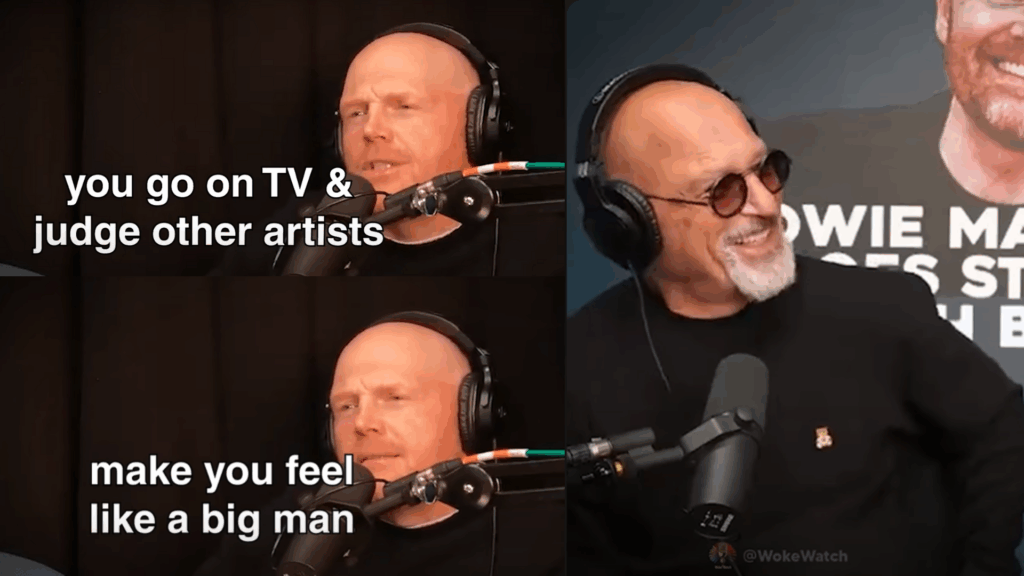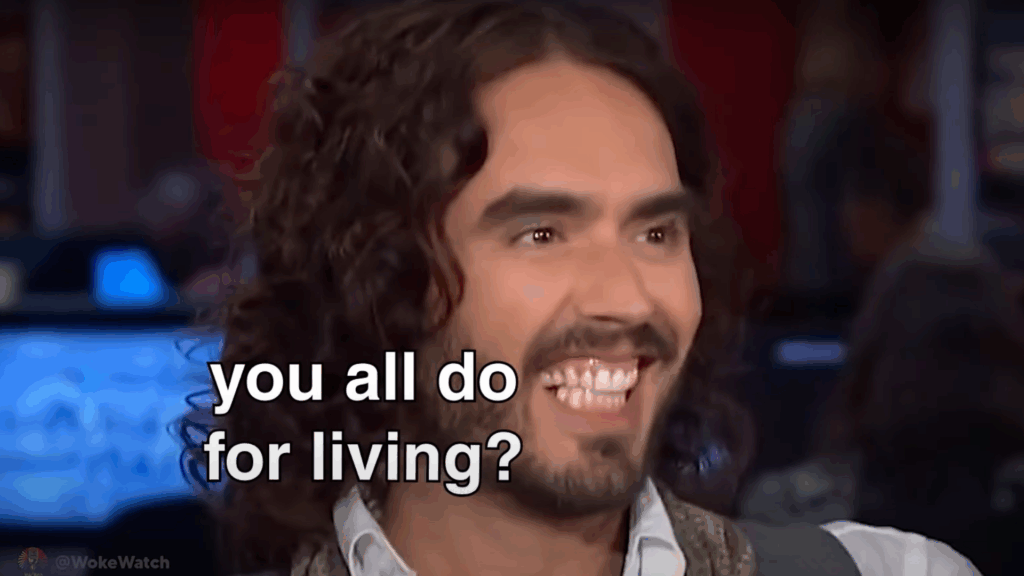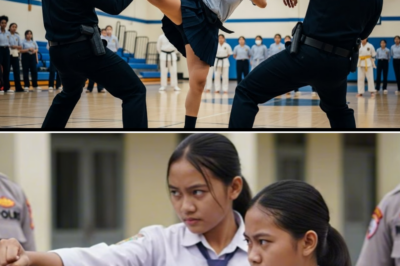Savage Laughs: When Comedians Hijack Talk Shows and Hosts Lose Control

Everyone loves a talk show for its cozy cocktail of celebrity gossip, gentle ribbing, and the illusion that we’re all just friends hanging out. But drop a stand-up comedian into that polished mix and suddenly, the rules evaporate. Gone are the safe, harmless jokes; in their place come razor-sharp roasts, brutal truths, and moments so uncomfortably honest that even the most seasoned hosts are left scrambling. When comics take over, no one—host, guest, or audience—is safe, and the result is live television gold.
The Roast Master’s Stage: Bill Burr vs. Howie Mandel
Bill Burr is notorious for his raw, unfiltered comedy, and he made a legendary example of Howie Mandel. Mandel, perhaps seeking a bit of vulnerability or camaraderie, wandered into personal territory—but Burr wasn’t interested in playing the polite TV guest. He flipped Mandel’s questions on their head, mocking his “war zone mentality” and dropping lines about British coldness in father-daughter relationships. Mandel’s attempt at intimacy was met with scathing humor that exposed insecurities rather than soothing them—leaving both Mandel and the audience both laughing and grimacing.

Chris Rock: Outwitting the Host, One Zinger at a Time
Then there’s Chris Rock, an Emmy-winning live wire ready to roast anyone within range. When Jay Leno prodded at Rock for “rooting” for certain Oscar contenders, Rock spun the question back, highlighting how the awards game changes lives for some and does nothing for others already at the top. When pressed further, Rock dodged landmines, refusing to call any movie a “clunker,” and instead shifted the attention back to Leno with sharp quips about his own movies and the dubious honor of going “straight to audio,” leaving Leno laughably outmaneuvered. You can almost see the hosts remembering not to poke the bear.
Comedians as Cultural Critics: From Jon Stewart to Whitney Cummings
Political satire meets talk show chaos whenever Jon Stewart sits down. Stewart’s now iconic showdown with Tucker Carlson on CNN’s “Crossfire” remains one of the most cited moments in TV history. Stewart didn’t just disagree; he called out the show’s very premise as partisan theater, mocked Carlson for his bow tie, and lambasted the network’s willingness to turn news into a puppet show. It was a masterclass in turning an interview into an intervention, with hosts struggling to keep the conversation civil while Stewart dismantled their professional persona.
Whitney Cummings takes cultural critique a step further—casually trashing everything from LA’s obsession with gender reveal parties to the “self-righteous” Hollywood trend of moralizing entertainment. On live TV, Cummings joked about the Democratic party’s 2024 lineup, comparing candidate choices to forced pharmaceutical ads and skewering the very fabric of political discourse. Her wit left the hosts frozen somewhere between laughter and dread, especially as she roasted CNN’s ratings—a cardinal sin at the network.
Ricky Gervais: Offense Is Easy, Honesty is Brutal
Ricky Gervais doesn’t mince words, no matter his audience. On Ellen DeGeneres’s show, when asked if he worries about offending people, his reply was simple: “It’s no trouble.” For Gervais, the real joke is how easily people take offense. “Some people are offended by equality,” he deadpanned, reminding the crowd that simply being upset doesn’t make someone right. In an age when tiptoeing around controversy is practically required, Gervais skips the dance entirely—and Ellen, usually comfortable in control, was visibly at a loss for words.
Meta-Roasts: Breaking Down the Talk Show Format
Some comedians don’t just tackle personalities and politics; they attack the very structure of the talk show. Russell Brand, for example, delights in redirecting questions, challenging hosts on the basics of communication (“refer to a person by their name, that’s good management!”). The resulting exchanges see hosts suddenly exposed, forced to reckon with their own talk show habits as Brand turns the spotlight on them.
Andrew Schulz brought this raw energy to podcasts, notably when he called out a host for checking his phone mid-interview. Instead of ignoring the slight, Schulz roasted the host on-air, insisting it was disrespectful and pointing out the double standards comedians face with distracted live audiences. The studio erupted, not just at the punchline, but at the blunt truth Schulz laid bare.

Patrice O’Neal: The Unvarnished Truth About Relationships
Then there are moments so honest, they’re almost uncomfortable. Patrice O’Neal’s matter-of-fact declaration—“We don’t like you”—about men preferring to hang out without their girlfriends, left a talk show host trying to keep the segment on the rails. O’Neal’s deadpan delivery, cartoonishly honest yet undeniable, forced a laugh from the host even as you could see the sting register.
Savage Honesty: The Magic Behind the Madness
What makes these moments so riveting isn’t just the humor, but what it reveals. Comedians are trained to sniff out hypocrisy and target it with surgical precision. On talk shows—settings designed for polite conversation and soft promotion—they bring chaos, but also a breath of truth. They challenge the hosts’ authority, call out artifice, and remind viewers that, under the surface, even our most comfortable formats are vulnerable.
As safe, scripted interviews become the norm, these comedic takeovers are both a warning and a promise: live TV might be unpredictable, but for a few outrageous minutes when a comedian grabs the mic, the laughs are real, the truths are uncomfortable, and for once, the jokes aren’t at the audience’s expense—the hosts are fair game, and nobody knows what’s coming next.
So, the next time a comedian sits down on your favorite talk show, don’t just expect laughs. Expect fireworks, real talk, and an unforgettable reminder—sometimes the people meant to be in control are the ones most likely to lose it
News
GANTIMPALA NG KABUTIHAN
GANTIMPALA NG KABUTIHAN ANG PUNDASYON NG PUSO UNANG BAHAGI: Ang Kadalisayan sa Gitna ng Karukhaan Sa isang maliit na bahay…
“BIBIGYAN KITA NG 100 MILYON KUNG MABUKSAN MO ANG KAHON”–NATAWA ANG MILYONARYO, PERO NAGULAT SA BATA
“BIBIGYAN KITA NG 100 MILYON KUNG MABUKSAN MO ANG KAHON”–NATAWA ANG MILYONARYO, PERO NAGULAT SA BATA ANG SUSI SA YAMAN…
TINDERO SA SARI-SARI STORE, PINAGPALIT NG NOBYA SA MAYAMANG LALAKIDI NYA ALAM NA BOSS PALA ITO NG…
TINDERO SA SARI-SARI STORE, PINAGPALIT NG NOBYA SA MAYAMANG LALAKIDI NYA ALAM NA BOSS PALA ITO NG… ANG PAGBABALIK NI…
Sundalong Mayabang Pinahiya Ang Binatilyo Sa Plaza! Pero Anak Pala Siya Ng Heneral Ng Sandatahang…
Sundalong Mayabang Pinahiya Ang Binatilyo Sa Plaza! Pero Anak Pala Siya Ng Heneral Ng Sandatahang… Ang Prinsipe ng Hukbo at…
NANAY, INIWAN NG ANAK MATAPOS NITONG GRUMADUATE SA KOLEHIYODI NYA AKALAING MAY SUPRESA PALA ITONG…
NANAY, INIWAN NG ANAK MATAPOS NITONG GRUMADUATE SA KOLEHIYODI NYA AKALAING MAY SUPRESA PALA ITONG… Ang Lihim na Bahay: Isang…
Bumawi ng Matindi ang Estudyanteng Pinahiya ng Pulis sa Harap ng Lahat!
Bumawi ng Matindi ang Estudyanteng Pinahiya ng Pulis sa Harap ng Lahat! Ang Apoy ng Prinsipyo: Kuwento ni Maya Dela…
End of content
No more pages to load












